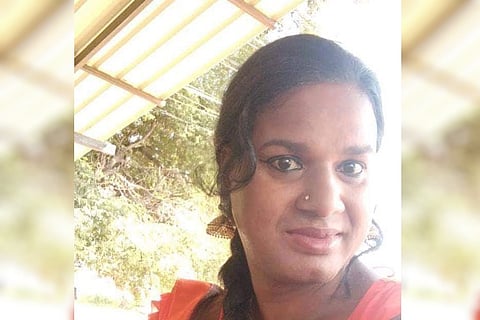

The mysterious death of a trans woman, Shalu, on Sunday in Kozhikode, has left the transgender community in Kerala, especially those in the city, visibly shaken and traumatised. The members of the community who received Shalu's body after autopsy and participated in her burial at the West Hill Public Cemetery in Kozhikode, are deeply grieved and feeling helpless.
Facing threats from different quarters on a daily basis, the community members in Kozhikode – like the rest of the country – says they’re living with fear and insecurity despite Kerala’s promises of being a trans friendly state.
“Right from when a person identifies in the LGBTQI+ spectrum, they’re literally abandoned by the family and by society at large,” says Sisily George, a trans woman and founder and president of Punarjani Cultural Society in Kozhikode. “Even after death, families claim ‘practical difficulties’ in accepting their kin’s mortal remains,” she rues.
In Shalu’s case, her birth family was there to receive her body – but they did not want to take her back to their native place for a deserving burial, fearing societal backlash.
“They handed over the body to us and we buried her, with no pastor or religious ceremony,” Sisily says, “It is painful that, just because of our identity, we remain abandoned through life, and even after death.”
‘Any of us could face the same fate’
The discrimination that LGBTQI+ persons face is more or less the same everywhere in India. Kerala is no different – in fact, it’s recently proving to be much worse than places like Chennai and Bengaluru, as is evident from violence that the trans community is facing in the state.
Arundhathi, a trans woman from Mandya district in Karnataka, is on the verge of tears as she remembers Shalu. “She used to call me Amma,” she says, “She was not into any kind of trouble and was a good person.”
Shalu had left her family five years ago after she told them about her gender. Arundhathi supported her for a few months when Shalu went to Mysuru for a surgery. She then left for Kerala, believing she will be accepted back in her own State. "I am extremely grieved at how she was 'accepted'. She spoke to me last week about an incident in which she was abused and hit by someone. We were planning to make an official complaint on the incident. But before we could, she has left us,” Arundhathi says.
Expressing an inherent fear which is shared by most members in her community, Arundhathi says, "Any of us could encounter the same fate as Shalu any day. We have no security for our lives – no life at all. Who is bothered about how we make a living, how we live, where we stay, and what we do?”
“Judging an LGBTQI+ person, passing lewd comments, and teasing are very easy for people. For us, it is not even easy to earn just enough to survive. We have been fighting for years to make ourselves heard. But still, there is a long way to go for society to accept us as individuals, not just sex objects,” she adds.
Systemic violence and discrimination
After Shalu’s death, the trans community in Kozhikode is especially scared. “I was attacked on the road twice last week – once by a gang who reached in a car near Kallayi, and another time, by two men on a bike near the Railway station premises,” says Pooja, a trans woman, “My dress was torn and my bag was taken away by those men. I had no money even to return home.”
Transgender persons routinely face violence across the country, and the discrimination they are put through is systemic. They face physical and verbal abuse, sexual exploitation, and are vulnerable to many other crimes, more so as the criminals exploit the lack of societal acceptance for transgender persons.
"I was physically abused, dragged, and slapped by a man in public, near Moideen Palli Masjid in Kozhikode, for declining to have sex with him,” says Vaiga, who lives in Kozhikode, “Not even one person from the public reacted or tried to stop him. This is the situation each of us faces day in and day out.”
And sadly, even some police men are either ignorant or add on to the violence that the community faces.
Recalling an incident, Vaiga says, "A few weeks ago, following a physical attack on a fellow trans woman at night, I had approached the police station to make a formal complaint. The policeman who was on duty asked to come back the next day in my ‘normal dress’ and ‘actual identity’ – as though this is my pretension.”
“Even though I told him that I am a trans woman and this is the kind of dress I wear, showing my salwar-kameez-dupatta, he was not ready to accept,” Vaiga says.
“However, many other police officers do understand what we undergo and are very helpful. We can't expect the society, which still practices discrimination based on caste, colour, religion, and economic status, to change overnight and accept us as equal individuals. We have to keep fighting for it,” she adds.
Kozhikode officials promise to step up
Considering the rise in crimes against transgender persons in Kozhikode, and in particular the case of Shalu, the District Social Justice Department is planning to have a detailed discussion with the LGBTQI+ community members here, so as to further understand, prevent, and resolve the problems they face in general.
Speaking to TNM, Sheeba Mumthaz, District Social Justice Officer, Kozhikode says, “We will have a meeting with the transgender community members to list out the problems they encounter, in the next two days. We hope that with the help of the police department, we can prevent such incidents of crimes against transgender persons to a large extent.”